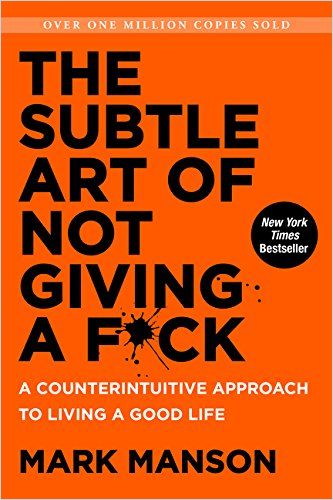Mark Manson wants the generations whom social media and consumer culture affect most to question what they see and believe, to grow up, and to prioritize their values. He promises the process will be painful and challenging, but worthwhile.

Putting It Bluntly
This book hit the New York Times bestseller list in October 2016 and has remained there since. By May 2020, it had been a bestseller for astonishing 179 weeks. Mark Manson obviously found the voice his audience seeks and trusts.
That voice is blunt, straightforward and surprisingly intelligent. It strives to convince you that Manson is a fount of commonsense knowledge that you understood in your gut, but needed someone to explain to you because so many other voices – the idiot wind of ever-present self-help books, blogs, TED talks and TV shows – drown out your own. And Manson proves convincing.
I heard one artist say that when a person has no problems, the mind automatically finds a way to invent some.Mark Manson
Don’t Avoid Pain
Manson moves quickly to identify sources of your likely angst. He states from the beginning that you must accept that modern life is hard. He notes that your newsfeed tells you everyone else is happy. Manson – accurately – savages how the average self-help book points out how you could improve. He rebels at these books’ core thesis: that happiness is a worthy goal.
Manson stresses that negative feelings are normal. Excessive positivity masks the problems you need to solve to be happy. Setting a difficult goal and achieving it, Manson insists, makes you feel powerful. Habitually complaining, blaming others and feeling offended feels great, but won’t solve your problems.
Manson offers a crucial, brief truth: True self-esteem doesn’t mean you feel good about yourself all the time.
He offers a classic checklist for becoming fearless that springs from the Stoics of Ancient Greece and their best-known philosopher, Epictetus: Rule number one, don’t get upset about every little thing. Number two, indifference isn’t the answer, either. Three, quit pursuing comfort. Four, stop trying to dodge all sources of pain. And five, most importantly: Decide what is truly worth caring about, and pursue it.
Solve Problems
Manson evokes the Stoics when he writes that emotions are unreliable. Don’t base decisions on feelings alone, because what makes you happy varies day to day, and humans always want more. Manson reminds you that you always face a trade-off between the pleasure you want and the price you need to pay.
Manson offers science suggesting that suffering provides an evolutionary advantage. It ensures people develop creative solutions and prevail as a species. Physical and emotional pain, the author insists, are alerts you need to change your behavior to survive.
Pretending you have no problems makes you neurotic. Pinning your problems on someone or something else makes you feel powerless. Manson again returns to the Stoics when he simply states his theme: solving problems makes you happy.
The anger is merely the messenger for my fist in your face. Don’t blame the messenger. Blame my fist (or your face.)Mark Manson
Entitlement can result from traumatic life experiences that make your problems feel insurmountable. Your unconscious, Manson explains, interprets powerlessness as a sign that you are either uniquely blessed and great, or uniquely cursed and inferior. Either way, you decide you deserve special treatment. But, Manson asserts, you don’t. And neither does anybody else.
Doubt Yourself
Manson maintains that self-awareness consists of:
- Identifying your emotions and expressing them in healthy ways.
- Exploring what belief caused the emotion.
- Knowing your values.
Manson details how worthy values are realistic, good for society and actionable – such as being honest, vulnerable and charitable. Unworthy values derive from superstition, are antisocial and out of your control – such as feeling pleasure, having wealth, being right and maintaining positivity.
Manson urges you to take responsibility. Choose how you characterize a problem and what you can do about it. He repeats that life’s not fair. Manson avoids riding a high horse as he offers this advice. He presents himself as someone who worked through painful emotional and psychological experiences. He offers his blunt style as the short-cut he was never able to find.
Don’t trust your conception of positive/negative experiences. All that we know for certain is what hurts in the moment and what doesn’t. And that’s not worth much.Mark Manson
Bad Brain
If you wait for the truth before acting, Manson warns that you will waste your life. He leaves the Stoics and enters the realm of Zen when he calls on you to resist the urge to be certain of anything about yourself, good or bad. Certainty stops you from trying, experiencing and growing. Question your perceptions, emotions and assumptions. Accepting uncertainty relieves insecurity, and opens your mind about yourself and others.
Manson offers modern neuroscience to detail how your brain deceives you. It misremembers, misunderstands and incorrectly attributes meaning to your experiences. Everything you believe is in some way wrong. Challenge what your brain tells you, Manson repeats, because it’s an unreliable narrator.
Manson suggests action as a panacea. If you wait for inspiration to motivate you to act, he says, you get stuck waiting forever. Action stimulates inspiration and motivation. Do something – the outcome doesn’t matter.
Death
Your inevitable death, Manson avows, makes life meaningful. Death makes you want to contribute to something bigger than your small, fleeting life. You know you’re going to die, so there’s nothing to fear.
At times, Manson’s authorial voice is too chummy, too frat-house living room on a Sunday afternoon. He addresses readers as “amigo” or revels in curse-words or dad-slang. This may soothe his – clearly young male – readers into heeding to his advice, but it grows tiresome. Women readers will feel distinctly excluded by Manson’s tone and attitude. Despite this, Manson offers centuries-old wisdom for facing pain and problems and learning courage and maturity therefrom.







